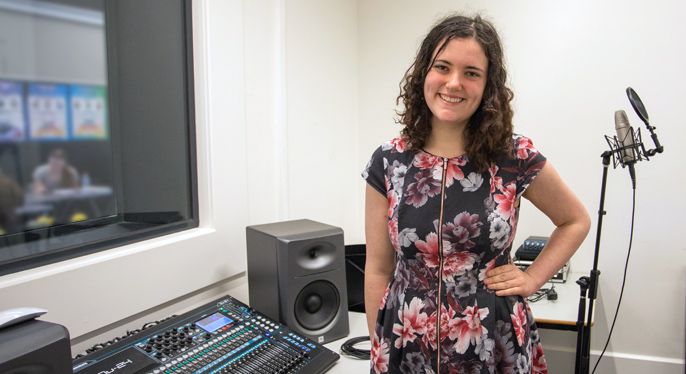Sophia is a Year 12 student with a very big dream.
In 2020 she hopes to move to Florida to go to university and study a Bachelor of Music Education. However, this is just an early step in her greater goal. Sophia wants to become a music teacher who specialises in teaching students with special needs—in particular, those on the Austism Spectrum.
“I eventually want to open a school and would love this to become a worldwide movement.”
To make this momentous move easier, Sophia’s boyfriend, Jameson Bruno, also lives in Florida and the university is well set up to cater for people with neuro-diverse conditions, such as autism.
Reflecting back over her own turbulent experience of school, Sophia, who was diagnosed with Asperger’s Syndrome at 12 years of age, would love to be able to go back and advise herself not to let her autism define her.
Like many people who are neuro-diverse, Sophia (who hates the words ‘disabled’ and ‘disorder’) experiences her surroundings intensely. While neuro-typical people filter out unwanted stimuli, ‘Aspies’ simply cannot do this. They often suffer sensory overload to movement, sound, light, touch or other stimuli that would not impact a neuro-typical person. For an Aspie such exposure can lead to what is colloquially called a ‘meltdown’.
“A meltdown is not emotionally or psychologically-based. It is a physical reaction to being completely neurologically overwhelmed.” Sophia explained. “Although I can’t always tell when they are coming on, I actually know what I need to do. No-one needs to help me. They just need to let me look after myself. Something I love about this college is that I can leave a classroom at any time without it being an issue.
“I’m now a proud ‘Aspie’ but I wish I could have told my 12 year-old self that even though people will objectify you because of this diagnosis—don’t let Aspergers define what you can and cannot do.”
Evidence that Sophia is already achieving this challenging goal can be seen in her sport. She recently represented Victoria in women’s hammer throw—Sophia is one strong girl!—and she is well on her way to a musical career. But she has also overcome some of the specific challenges associated with Aspergers.
“My biggest achievement at BSSC was to develop a healthy, functional social life—something at one point I didn’t think I’d ever have because communication is such a major issue,” she said. “I’m often very reticent when I meet new people or am in a new setting or situation. I have some issues with volume control of my voice, and I can have trouble staying on-topic and mostly feel as though I’m walking on eggshells. I also have dysgraphia—difficulty writing information down.
“There were times when I was excluded. I was kicked out of one school band because they said I was ‘not coping’ and I was too difficult to cope with.
“At school I was always put in the groups who were struggling, even though I am quite clever—I just couldn’t write well or quickly. And Aspergers is misunderstood… someone once asked me if it was contagious.
“Being asked to leave the band made me feel I was faced with leaving music altogether. But I have persevered and, although I had to give up studying Music Composition because I couldn’t do the exam, BSSC has been the best for me.
“Here, I have not been alienated. I’ve found my place and made new friends.”
It would easy to fall into the trap of focusing only on the challenges that Sophia faces daily as a neuro-diverse person. However, alongside these challenges lie Sophia’s fabulous abilities that have contributed to her outstanding achievements. Eager to get to BSSC, Sophia completed all of Year 9 and Year 10 in one year and came to BSSC via NetSchool.
She has an amazing memory and an incredible capacity for concentrated hard work. She can recall events from when she was only one. She is synesthetic and hears music in colour—for her Bb is a reddish-orange colour and B Major is a series of wonderful blues—from cyan to turquoise. In fact, Sophia only realised quite recently that others do not hear in colour.
“I also have perfect pitch and when something is out of tune, I feel sick in my stomach.”
Music has been a part of her life as far back as Sophia can remember.
“I played on the piano even before I could walk,” she said. “Being pitch-perfect I could remember what all the notes sounded like and could replay them. I was only four or five when I was able to replicate Beethoven’s Fur Elise.
She has come a long way since then and was recently the recipient of BSSC’s 2018 Musician of the Year Award. Her pieces were La fille aux cheveux de lin by DeBussy and Strange Times by L. Davidson. In awarding Sophia, the adjudicator highlighted not only Sophia’s high commitment and artistry in performance, but also her aspirations to make a difference in the world.
“I had always wanted to play sax but I learnt recorder from Year 3 to Year 6—a good precursor to Sax. I picked up the saxophone in my last year at primary school.”
After just a year, Sophia sat the AMEB Grade 4 exam and has continued to progress under the tutelage of Dr Michael Lichnovsky. Her favourite piece is the second movement of John Cheetham’s Sonata for Alto Saxophone.
In 2016, Sophia also began taking singing lessons with Louise Matthews and will complete her Grade 4 exam in classical voice at the end of this year.
“Given that at least 1% of people are on the autism spectrum, I think educators need to be far more aware and trained to deal better with neurodiversity,” Sophia said. “There is much in the media, but there is not enough flexibility in the education system to cater for aspies. The term is often used in a derogatory way insinuating that people on the autism spectrum are intellectually-challenged as well.”
Reflecting back on her own experiences, Sophia says she has gone from “defeatist to challenge accepted!”
“I think winning BSSC Musician of the Year means that I can say, ‘Autism did not stop me. I got there and now I can get on with the next chapter of my life’.”











